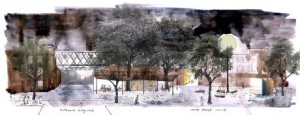Ken Worpole ~The Law Of The Forest And The Freedom Of The Streets

“ This was the order of human institutions: first the forests, after that the huts, then the villages, next the cities, and finally the academies.”
Giambattista Vico, The New Science
‘What the fuck do you think an English forest is for?’ raged Johnny ‘Rooster’ Byron, when served with a notice to move his caravan from its woodland clearing, in Jez Butterworth’s 2009 anti-Arcadian play, Jerusalem. The kids who come there, he claimed, are safer than at home. This is where the wild things are. The opening stage direction: ‘England at midnight’.
Butterworth’s explosive ‘state of the nation’ drama raised many questions about the state of the nation. In a highly urbanised society, talk of the ‘meaning’ of the forest today might seem anachronistic. Yet it raises anew the spectre of waking up to find that many historic freedoms–about rights to roam and freely associate (and on occasions run foul of the law)–have been subtly suborned, or deleted.
As the 1215 Magna Carta is being celebrated, it is a good time to remember its significant addendum, the 1217 Charter of the Forest. The Forest Charter formalised the right of unbonded men to access and use of the goods of the royal forests (grazing, fuel, food), while implicitly assuming the right to wander freely in the landscape as well as providing a place of refuge for those cast out of the social order. Forest sentiments still run deep, it would seem. It was public protest against the sale of Forestry Commission woodlands which prompted the first political turnaround of the present Coalition government in 2011.
Read more: https://www.opendemocracy.net/law-of-forest